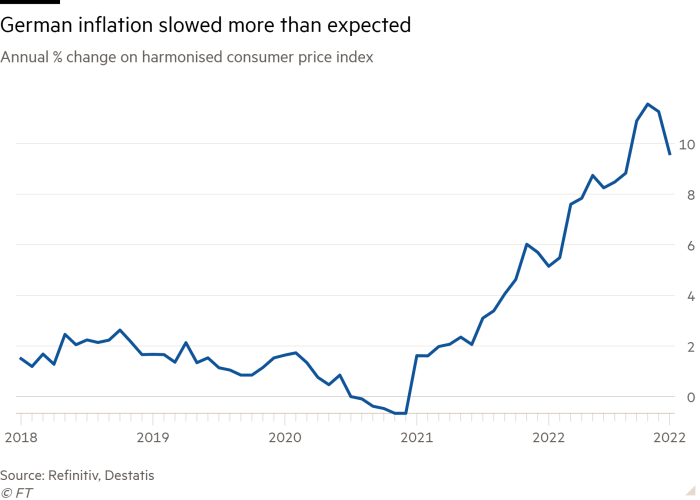German inflation slowed more than expected in December, sliding below 10 per cent and providing some relief for the European Central Bank in its battle to control price rises.
Partly because of measures by Berlin to shield consumers from high gas prices, the annual pace of harmonised consumer price inflation dropped to 9.6 per cent in December, well down on the 11.3 per cent registered the previous month.
The figure, published by the country’s federal statistical agency on Tuesday, was also lower than the 10.7 per cent forecast by economists polled by Reuters.

The better than expected German number — down from a seven-decade peak of 11.6 per cent in October — follows a sharp fall in inflation in Spain and may ease pressure on the ECB, which will next meet to set rates on February 2.
Together, the German and Spanish figures suggest that eurozone inflation could drop more than forecast when data is published on Friday. Economists polled by Reuters forecast eurozone inflation to have dropped to 9.7 per cent in December, down from 10.1 per cent in November.
However, most economists still expect the ECB to raise the benchmark rate by 50 basis points in February.
Claus Vistesen, chief eurozone economist at Pantheon Macroeconomics, said that, while the decline in German inflation was “welcome”, it could be partially driven by subsidies. “This, in turn, points to stronger underlying pressure on core inflation,” he added.
Helped by the German government measures, the annual pace of the country’s energy inflation slowed to 24.4 per cent in December from 38.7 per cent in November.
“Since the beginning of the war in Ukraine, energy and food prices in particular have risen noticeably and have a significant impact on the inflation rate,” said Destatis, the country’s official statistics agency.
“In December 2022, however, the one-off assumption of the monthly deduction for gas and heat by the federal government had the effect of lowering prices,” it added.
By contrast, services inflation accelerated to 3.9 per cent from 3.6 per cent in November.
Separate data from the Federal Labour Office, also released on Tuesday, showed that German unemployment fell by 13,000 in December, lowering the jobless rate by 0.1 percentage points to 5.5 per cent.
Oliver Rakau, chief German economist at Oxford Economics, said the robustness of the German labour market would also “likely bolster the ECB’s view that the [eurozone] recession is set to be shallow and that underlying price pressures remain too strong to stop tightening for now”.
Germany’s 9.6 per cent figure for December inflation reflected so-called harmonised prices, a pan-European measure. Separately, the German consumer price index came in lower at 8.6 per cent, down from 10 per cent in November.
Franziska Palmas, senior Europe economist at Capital Economics, said she expected inflation to rise in January when gas and heating subsidies end. However, inflation was “set to fall sharply from March onwards, when the government gas and electricity price caps kick in”, she added.
Additional reporting by George Steer
